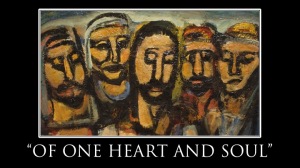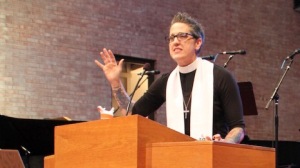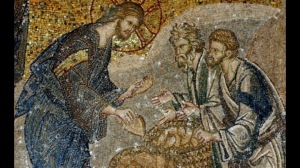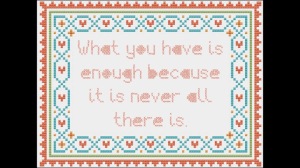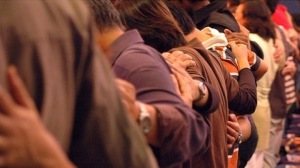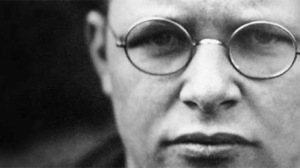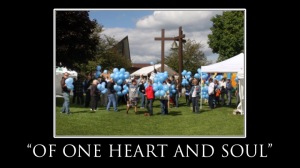Time for Wonder*
A Reading of Isaiah 11:1-10 NRSV Embodied [motions in brackets]
[One arm flat, other arm rising beside it]
A shoot will grow up from the stump of Jesse;
a branch will sprout from his roots.
[Hands on shoulders for each line]
The Lord’s spirit will rest upon him,
a spirit of wisdom and understanding,
a spirit of planning and strength,
a spirit of knowledge and fear of the Lord.
He will delight in fearing the Lord.
[Cover eyes]
He won’t judge by appearances,
[Cover ears]
nor decide by hearsay.
[Extend hand in offering a hand up]
He will judge the needy with righteousness,
and decide with equity for those who suffer in the land.
[Open mouth]
He will strike the violent with the rod of his mouth;
[Strong exhale]
by the breath of his lips he will kill the wicked.
[Hands on hips]
Righteousness will be the belt around his hips,
and faithfulness the belt around his waist.
[Form claws and release]
The wolf will live with the lamb,
and the leopard will lie down with the young goat;
the calf and the young lion will feed together,
[Gesture as if introducing young child]
and a little child will lead them.
[Act as if chewing cud]
The cow and the bear will graze.
Their young will lie down together,
and a lion will eat straw like an ox.
[move arm like snake]
A nursing child will play over the snake’s hole;
toddlers will reach right over the serpent’s den.
[Arms form mountain]
They won’t harm or destroy anywhere on my holy mountain.
[Arms form valley]
The earth will surely be filled with the knowledge of the Lord,
[Arms make a wave]
just as the water covers the sea.
A signal to the peoples
[One arm flat, other arm rising beside it]
On that day, the root of Jesse will stand as a signal to the peoples. The nations will seek him out, and his dwelling will be glorious.
“Stumped”
Isaiah 11:1-10
December 8, 2019, Boeuff Presbyterian Church
“A shoot will grow up from the stump of Jesse; a branch will sprout from his roots.” These words that we read and acted out today are curious. We’ve all seen stumps, right? Stumps are what’s left when you cut down a tree. Often that tree is cut down because there’s something wrong with it, disease or other forces of nature causing it to no longer be viable.
In the verses just preceding our passage we read that God had been the one to reduce those who have been opposing God’s will to a stump. In Isaiah 10:33-34 we read, “Look, the Sovereign, the Lord of hosts, will lop the boughs with terrifying power; the tallest trees will be cut down, and the lofty will be brought low. He will hack down the thickets of the forest with an axe, and Lebanon with its majestic trees will fall.”
So now we have before us a people who have been cut down completely due to going against God’s will for them. The history of this is a bit complicated, but essentially, the military rulers tried to get around what Isaiah had advised by trying to work with the powers that be against a rebellion, which caused societal collapse and ruin.
Those originally hearing this prophecy are still seeking the redemption promised by the branch growing out of the stump. They remain in exile, utterly stumped by their circumstances. Their lives are devoid of peace, both from within and without. They need this promised resurrection of their people’s viability, but struggle to dare to expect what has been promised. What will become of them?
Hope in the midst of seeming hopelessness is a familiar story both in the Bible and in our media, as that variety of redemption is very compelling. Adam and Eve starting over from exile from the Garden of Eden, Noah’s family rising out of the devastation of the flood, Moses’ redirection from a burning bush in the wilderness, and, of course, Christ’s death and resurrection. We are a resurrection people, after all, and operate from knowing that resurrection is on it’s way, whatever the circumstances may be.
But, that is not where these people find themselves yet. They are yearning mightily for the peace forecasted in Isaiah’s prophecy. And it’s important to name that faithfulness within desperation can still look pretty desperate.
Yesterday, Calvin and I went to see Frozen 2 in theaters. I won’t spoil it for those who haven’t seen it, but there’s a scene, as there is in so many heroes’ journeys when it seems like all hope is lost. The song that the main character sings in that time was especially gripping to me because it worked from despair to hope. Anna sings:
“I’ve seen dark before
But not like this
This is cold
This is empty
This is numb
The life I knew is over
The lights are out
Hello, darkness
I’m ready to succumb
…Can there be a day beyond this night?
I don’t know anymore what is true
I can’t find my direction, I’m all alone
The only star that guided me was you
How to rise from the floor
When it’s not you I’m rising for?
Just do the next right thing
Take a step, step again
It is all that I can to do
The next right thing”
When your context is despair, choosing to do the next right thing can be a revolutionary act.
The next right thing. For the despairing Judeans in the face of ruin, it looked like placing hope in the leadership of a new king, a young Hezekiah, who just might have it within himself to turn things around. He is the shoot beside the stump. Isaiah’s hope in what seems hopeless.
A stump is most often the end of the tree. But in our text we hear of a tenacious branch coming up alongside, it’s unexpected, and reflects hope in the midst of hopelessness.
Something else that seems impossible In these verses is the account of animals who are naturally enemies laying down beside one another. Working Preacher, a lectionary website and podcast from Luther seminary, points to how these passages don’t say that the wolf is no longer around the lamb or that the snake is no longer going to be terrifying to the worried parent, but that this peaceable Kingdom, as it is often called, removes the wolves desire to hurt to hurt the lamb and leave the snake to no longer strike in the hands of a child playing near. I can imagine a child being naive to the risk of being around a serpent, but struggle to imagine a lamb choosing to lie down beside a wolf. Achieving the peaceable kingdom causes not only peace, but also the internal reformation of impulse to see the enemy as an enemy. It is not instinctual.
And so that brings me to us. We live in a world that is not always, or some may say often, peaceable. There are wolves in this world that are far more than mere metaphors. But the hope of peace is that God can transform the motivations and desires of those who seek to harm us as well and at the very same time liberate us from our fear. This does not mean we are to be doormats to those who want to harm us, but that only when we are willing to see the image of God at work in our enemy are we able to begin to work towards true restorative peace.
Peace, our Advent Wreath word of the day, is so much more than a graduation speech platitude or a hand sign thrown out by a surfer. It is borne through the active work of seeking justice. It is seeking the next right thing when at the impasse of misunderstanding and pain.
In 1955, Martin Luther King Jr. responded to an accusation that he was “disturbing the peace” by his activism during the Montgomery Bus Boycott by saying, “True peace is not merely the absence of tension: it is the presence of justice.”
Where in our world are we witnessing injustice? How can we do the next right thing, seeking peace right where we are? What is the new life that God is springing up alongside our desperation? May we be agents of God’s peace. Amen.
*Time for Wonder is what we do at Boeuff Presbyterian as a time for people of all ages to engage with the scripture/sermon in a more interactive way. In other contexts it is often called “Time with Children” or “Children’s Sermon.”
